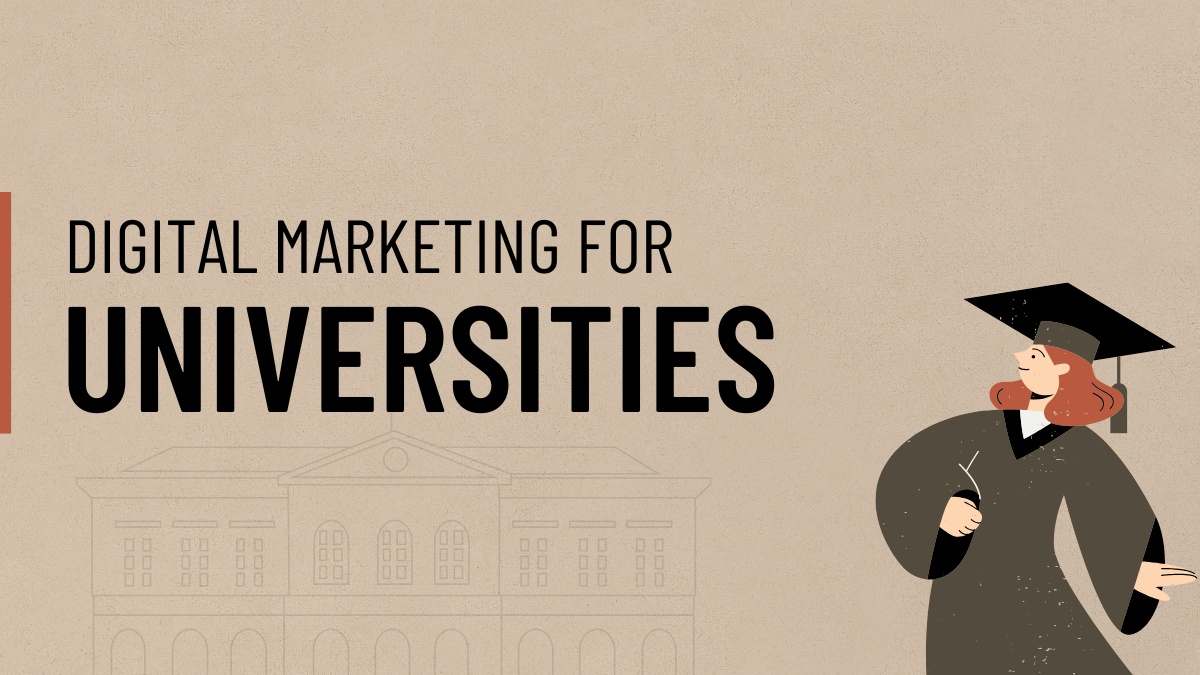
Digital Marketing for Universities
The landscape of student recruitment has shifted. The traditional methods of college fairs and glossy brochures are no longer enough to capture the attention of prospective students. Today, the journey to higher education starts online, with a Google search, a social media scroll, or a video that tells a compelling story. This is the world of digital marketing for universities.
Think of digital marketing as your university's voice in a crowded digital room. It's how you cut through the noise, connect with the right students, and show them why your campus is their perfect future home. This comprehensive guide will break down everything you need to know, from foundational strategies to emerging trends, helping you build a marketing plan that drives enrollment and showcases your institution's unique identity.
We will explore the essential strategies that can elevate your university's brand, connect you with a global audience, and deliver measurable results.
Why Digital Marketing is Non-Negotiable for Universities

Let's begin with the fundamental "why." You may have a stunning campus, award-winning faculty, and innovative programs, but if prospective students can't find you online, you're invisible to a huge portion of your audience. The modern student's path to application is paved with digital touchpoints.
Digital marketing empowers your institution to:
-
Reach a Global Pool of Talent: Your potential student body is no longer confined by geography. You can engage with bright minds from across the country and around the world, diversifying your student population.
-
Craft and Control Your Brand Narrative: This is your opportunity to tell your university's story on your own terms. What makes you special? Is it your groundbreaking research, your vibrant and inclusive student life, or your powerful alumni network? Digital marketing lets you shape this perception.
-
Engage Directly with Future Students: You can have authentic, two-way conversations with prospects on the platforms they use daily. This direct line of communication builds trust and fosters a sense of community before they even set foot on campus.
-
Achieve and Track Measurable ROI: Unlike a print ad or a billboard, every aspect of digital marketing can be tracked. You get clear data on what strategies are working, which are not, and how to allocate your budget for maximum impact.
With the "why" established, let's dive into the practical "how."
SEO: Be the First Answer to Their Questions

Search Engine Optimization (SEO) is the art and science of making your university appear at the top of search engine results when students look for programs like yours. When a prospective student types "best marine biology undergraduate programs" or "affordable online MBA," you want your institution to be their first and best answer.
Foundational SEO for Higher Education
-
Keyword Research is Key: Start by thinking like your prospective students. What phrases would they use? Use tools like Google Keyword Planner or SEMrush to discover terms related to your programs, location, campus life, and unique selling points. Target both broad terms ("business degrees") and long-tail keywords ("bachelor of science in marketing with a digital focus").
-
Optimize Your Program Pages: Each degree page is a critical landing page. It must contain your target keywords, but more importantly, it needs to be comprehensive. Include detailed curriculum information, faculty profiles, potential career paths, admission requirements, and clear calls-to-action like "Request Info" or "Start Your Application."
-
Build a Resourceful Blog: A university blog is an SEO powerhouse. It allows you to create content that answers the thousands of questions students have. Write articles like, "How to Prepare for Your College Admissions Interview," "A Guide to Financial Aid and Scholarships," or "What Can You Do with a Degree in Psychology?" This positions you as a trusted advisor.
-
Master Local SEO: For many universities, attracting local and regional students is a priority. Ensure your Google Business Profile is fully updated with the correct name, address, phone number, and high-quality photos. Encourage reviews from current students and alumni to build social proof.
Content Marketing: Tell Stories That Resonate

Content marketing is the engine of your digital strategy. It’s about creating and sharing valuable, relevant, and consistent content to attract and retain a clearly defined audience. Instead of a hard sell, you're providing value that builds relationships.
Your content should be a window into the soul of your university.
Compelling Content Ideas for Universities
-
Student and Alumni Success Stories: Feature current students or graduates in blog posts or short videos. Did a recent grad launch a successful startup? Did a current student win a prestigious research grant? These stories provide powerful social proof and help prospects visualize their own success.
-
"A Day in the Life" Video Series: Authenticity wins. Create unpolished, genuine videos that follow different students through their day. Show them in class, grabbing lunch, participating in a club meeting, and studying in the library. This gives an honest glimpse into your campus culture.
-
Faculty Spotlights and Interviews: Your professors are experts in their fields. Interview them about their research, their passion for teaching, and their industry insights. This showcases the academic rigor and intellectual capital of your institution.
-
Interactive Virtual Campus Tours: Go beyond a simple photo gallery. Invest in a high-quality 360-degree virtual tour that allows prospective students to "walk" through campus, explore lecture halls, and see inside dorm rooms. This is invaluable for international students or those unable to visit in person.
Social Media: Engage Where Your Students Are

Prospective students are on social media. It's where they connect, discover, and form opinions. Your university cannot afford to be absent from these conversations. The key is to choose your platforms wisely and focus on genuine engagement.
Choosing and Using the Right Platforms
-
Instagram & TikTok: These visual platforms are perfect for showcasing campus life. Use high-quality photos, short video Reels and TikToks of student events, and "takeovers" where a student or professor runs the account for a day. Use polls, Q&As, and quizzes in your Stories to boost interaction.
-
Facebook: Facebook has a broad demographic, making it ideal for reaching students and their parents. Share university news, announce upcoming events, promote blog content, and run targeted ad campaigns. Creating private Facebook Groups for newly admitted students can build excitement and a sense of community.
-
LinkedIn: This is your professional platform. It's essential for promoting graduate programs, highlighting your career services, and building a strong alumni network. Share articles about the career success of your graduates and post updates from your various schools and departments.
-
YouTube: As the world's second-largest search engine, a well-curated YouTube channel is a must. Host everything from virtual tours and student testimonials to recorded lectures from popular professors and "how-to" videos for the application process.
Email Marketing: Nurture Leads into Applicants

Once a student expresses interest by downloading a viewbook or requesting information, email marketing becomes your most powerful tool for nurturing that lead. It allows you to deliver personalized, relevant information directly to their inbox, guiding them along the path to application.
Designing an Effective Email Nurture Campaign
-
The Welcome Sequence: Don't just send one welcome email. Create a 3-5 email sequence that introduces your university, highlights key selling points, and points them to valuable resources.
-
Segmentation and Personalization: Do not send the same email to everyone. Segment your list based on the program of interest, entry term, or location. Use personalization tokens to include the student's name and reference their specific interests. This makes your communication feel personal, not automated.
-
Value-Driven Content: Your emails shouldn't just be sales pitches. Send them links to relevant blog posts, invitations to virtual information sessions, and videos featuring students from their program of interest.
-
Clear Calls-to-Action and Deadline Reminders: Every email should have a purpose. Guide them to the next step, whether it's scheduling a call with an admissions counselor or starting their application. As deadlines approach, send a series of friendly, helpful reminders.
Paid Advertising: Precision Targeting for Immediate Results

Organic strategies like SEO and content marketing take time to build momentum. Paid advertising offers a way to get your message in front of a highly specific audience quickly and efficiently.
Paid Ad Strategies for Universities
-
Paid Search (PPC): Bid on keywords in Google and Bing so your university's ad appears at the top of the search results. You can target keywords for specific degrees ("master of public health online"), competitor names, or general queries ("best colleges for engineering").
-
Social Media Advertising: The targeting capabilities on platforms like Facebook and Instagram are incredibly granular. You can target users based on age, location, interests (e.g., "Student government"), educational background, and even life events (e.g., "graduating high school").
-
Retargeting Campaigns: This is a crucial tactic. Use a tracking pixel to show targeted ads to people who have already visited specific pages on your website. If someone viewed your nursing program page but didn't inquire, you can show them ads across the web featuring testimonials from your nursing students.
Emerging Trends to Watch in Higher Ed Marketing
The digital world is always changing. Staying ahead of the curve can give your university a significant advantage.
-
AI-Driven Personalization: Artificial intelligence can help you personalize the student journey at scale. This includes using chatbots on your website to answer questions 24/7 and dynamically changing website content based on a user's browsing behavior.
-
Influencer Collaborations: Partner with current students who have a strong social media presence ("micro-influencers") to create authentic content. Their endorsement is often seen as more trustworthy than official university marketing.
-
The Dominance of Short-Form Video: Platforms like TikTok and Instagram Reels are not just for fun; they are powerful recruitment tools. Create engaging, short videos that are informative, entertaining, and shareable.
Overcoming Common Challenges
Implementing a digital strategy isn't without its hurdles.
-
Challenge: Limited budget and small team.
-
Solution: Start small and focus on one or two channels. Prioritize organic strategies like SEO and blogging, which have a high long-term ROI. Repurpose content across platforms (e.g., turn a blog post into a video script and social media posts).
-
Challenge: Silos between departments (Admissions, Marketing, Academics).
-
Solution: Create a cross-functional digital marketing committee that meets regularly. This ensures consistent messaging and allows for the sharing of ideas and resources.
-
Challenge: Difficulty proving ROI to leadership.
-
Solution: Focus on key metrics that tie to enrollment goals. Track website inquiries, application starts, and cost-per-application. Use tools like Google Analytics to create clear, concise reports that demonstrate the direct impact of your efforts.
Final Thoughts
Digital marketing for universities is not a checklist of isolated tasks. It is an integrated ecosystem where each strategy supports the others. Your SEO efforts drive traffic to your content, your social media promotes that content and engages your audience, and your email campaigns nurture the leads you generate.
By building a strong digital foundation, telling your university's unique story, and engaging with students in an authentic way, you can build a powerful marketing engine. This approach will not only help you meet your enrollment targets but also build a vibrant, thriving campus community for years to come.
30 minutes
Expert Consultation
Terms & Agreements
By booking a free 30-minute consultation, you agree to our terms, including scheduling, cancellation policies, and confidentiality. The session provides expert advice without guarantees of specific outcomes or results.





Leave a Reply
Your email address will not be published. Required fields are marked *